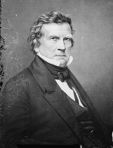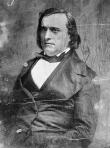Original Stealing Cuba: parts 1, 2, 3, 4, 5, 6
Despite his heroic efforts on the Nebraska front, Franklin Pierce had not quite done enough to wreck his party in the North just yet. He still had one more trick left in him, whether he knew it or not. By the fall of 1854, Pierce had given up on stealing Cuba via John A. Quitman’s filibustering. He might have still held out some hope for Pierre Soulé’s revolutionary machinations in Spain but nothing had come from them but Soulé’s word that something might eventually come from them. He might have withdrawn Soulé, but that would make Pierce look weak to the expansionists. Sending a special Cuba commission to join him would mean undercutting the Frenchman, who had served as the face of Cuban annexation in Madrid. Getting rid of such a terrible diplomat would help and hurt the cause simultaneously.
With every option looking terrible one way or another, Pierce decided to give one last go at Cuba. If he could not get the island, could he perhaps persuade Spain’s chief defenders, the British and French, to change positions and put pressure on Madrid? This has the sound of grasping at straws, and much of the same in substance, but factors beyond Spain’s control did push for a sale. Eventually the holders of Spanish bonds would want their money back. Spain could afford neither paying them nor the investments in infrastructure it would need to produce the revenue to do so in the future. Without the umbrella of British power especially, Spain would have much more trouble resisting the pressure to sell even if Madrid loathed to give up one of its remaining possessions abroad. It could happen.
On August 16, 1854, Secretary of State William Marcy sent off new instructions to Soulé. He should keep his eye on Spanish politics for any chance to upset the status quo on Cuba. Marcy probably didn’t need to tell him that but his second note of the same date told Soulé that he would meet up with James Buchanan, coming down from London, and John Y. Mason, coming over from Paris. They could not meet in Paris, the logical midpoint between Madrid and London, because they expected that Louis Napoleon’s spies would know everything they said before they finished saying it if they did. Thus they landed at Ostend in Belgium.
The idea for the conference apparently came from Pierce himself and so the blame for the fiasco should rest with him as well. Allen Nevins tells what Marcy thought of the principals:
Inasmuch as Marcy disliked Soulé and his ways, thought Mason a pompous windbag, and regarded Buchanan rather contemptuously, it is very unlikely that he expected anything from the meeting.
Nevins also calls the Ostend conference an attempt by “three second-rate brains” to produce “one first-rate idea.” But Pierce apparently believed in the effort. The fact that Soulé high-tailed it out of Madrid at the end of August with suspicion, likely true, that he’d helped stage a brief uprising in the capital certainly got the matter off to an interesting start. A cluster of American diplomats milling about Paris in September gave Europe little reason to doubt that the United States intended to hatch something. Given the late aggression toward Cuba, they hardly had to guess what.
I’ve already dealt with the Ostend Manifesto that came out of the meeting (parts 1, 2, 3) and don’t yet have much to add to what I wrote then, but it deserves some consideration in context. Here, just as with Nebraska, Franklin Pierce put the northern Democracy in a bind. He openly connived to secure Cuba by hook or crook as a new slave state, on top of having just delivered all the Great Plains over to slavery. What would satisfy the man? Would he rest while a free state yet existed?
The full manifesto did not get out until March of 1855, but garbled accounts hit the papers in November just on the wake of the Democracy’s great defeats. If nothing else, it would have helped keep northern anger alive. That anger coming on the heels of the Democracy’s defeat essentially ended the administration’s Cuba ambitions. That that anger also involved the possible annexation of a Spanish, Catholic island further inflamed the Know-Nothings. Everybody except Lower South expansionists and friends of filibusters, a minority even there, and Missouri slaveholders, had plenty of reason to hate the Democracy in the waning months of 1854.
Marcy wrote Soulé a long dressing-down in November, surely with a mind to the fact that his party had done remarkable work in assembling an opposition coalition against itself. The Frenchman briefly found himself forbidden to traverse France on his way back to his Spanish post. When he did return, he found his most glacial reception yet. With his own staff rising against him, Soulé finally resigned in December, 1854.





You must be logged in to post a comment.